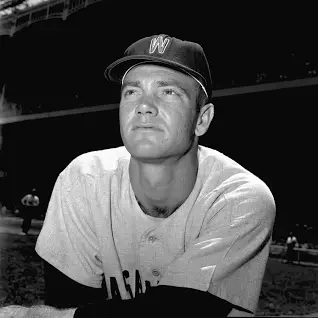Scroll Down to Read Today’s Essay
Subscribe to Baseball History Comes Alive for automatic updates. As a Free Bonus, you’ll get instant access to my Special Report: Gary’s Handy Dandy World Series Reference Guide!
Today Vince Jankoski returns with an interesting essay setting the record straight on who actually is the record holder for strikeouts in a major league game. It’s not someone I ever would have guessed! -GL
Player Stoplight:
The Senators’ Tom Cheney – The Real Strikeout King!
A few years ago, my alma mater, in an effort to reach out to its alumni and thereby entice donations, offered to its alumni undergraduate classes for a nominal fee. Unable to pass up a bargain, I took the bait and enrolled in a political science course.
The professor was energetic and quite knowledgeable. He was also a baseball fan so much so that he umpired youth baseball games. You gotta love the game to do that!
During one class, he posted on the classroom monitor a picture of Kerry Wood and proudly (he was a Cubs fan) proclaimed that Wood had the major league record for most strikeouts in a single game. It is rare that the student can correct the teacher, but this was my moment. I pointed out that Wood only had the record for Ks in a nine-inning game. Actually, Wood shares that record with Roger Clemons who did it twice, Max Scherzer, and Randy Johnson.
I recounted that the record for most strikeouts in a major league game is 21 by the Washington Senators’ Tom Cheney who set the record in Baltimore on September 12, 1962. It took Cheney 228 pitches to record 48 outs. The Senators won the game 2-1 in a shade less than 4 hours. Bud Zipfel got the winning hit in the top of the 16th. Manager Mickey Vernon offered to remove Cheney after the ninth inning, but Cheney refused. He wanted to finish what he started. And he did. Big time. Cheney gave up ten hits, six singles, four doubles. He walked four. Four of his strikeouts came in the final three frames. In those days of four man pitching rotations, Cheney started previously on September 7. Given his iron-man effort, he was given a break. He did not start again until September 18.
Cheney was an unlikely record-breaker. His career record was 19-29 with an ERA of 3.77. He had a lively arm, albeit a bit wild. For his career, he struck out an average of 6.7 batters per nine innings while walking 4.7 hitters every nine innings.
Cheney started his big league career with St. Louis. He was traded to Pittsburgh where he pitched in three games in the 1960 World Series. In four innings, he struck out six, giving up four hits and two earned runs for the Bucs. He went to the expansion Senators in 1961. He had his best seasons in Washington, going 7-9 with an ERA of 3.17 the year he set the strikeout record and 8-9 with an ERA of 2.71 the following season. The Senators finished tenth in each of those seasons, losing 101 and 106 games respectively.
Cheney’s victims on that September night in 1962 were no slouches. Although they finished in seventh place, Baltimore had formidable hitters: Boog Powell, Jim Gentile, Brooks Robinson, and Dave Nicholson. Gentile, Nicholson, Marv Breeding, Russ Snyder, and relief pitcher Dick Hall were each victimized three times. Powell admitted shortening his swing to avoid being among the many who went down swinging. He went 1 for 6 with a walk.
Powell was the most vocal about Cheney’s efforts. Powell remembered the sound of Cheney’s curveball. “You could hear it go by you. It was like it was humming.” Players often claim that they could hear a pitcher’s fastball, but a curveball? No. Powell compared Cheney’s hook that day to that of Bert Blyleven even going so far as to say that on that day Cheney’s had a bigger break. “It was a bigger breaker than Blyleven’s,” said Powell. “It was a 12 o’clock to 6 o’clock, and I mean he used all of it. It was a big breaker and it was hard. He had it going.”
Milt Pappas, the Orioles’ starter, was also impressed. He said of Cheney, “He kept everybody off their toes and he had great stuff and he was hitting the corners. He pitched one of those games you dream about.”
Cheney was not a big guy by the standards of power pitchers, 5’11”, 170 pounds. By comparison Wood is 6’5” and 210 pounds. Clemons stands 6’4” and weighs in at 205 pounds. Johnson is 6’10’ and 225 pounds. Cheney died in his native Georgia in 2001 at age 67. He had his 15 minutes of fame – actually four hours of fame – on the night of September 12, 1962. He was a most unlikely record-setter.
Vince Jankoski
Subscribe to our website, Baseball History Comes Alive with over 1400 fully categorized baseball essays and photo galleries, now surpassing the one million hits mark with over 1,163,000 hits and over 950 subscribers: https://wp.me/P7a04E-2he

